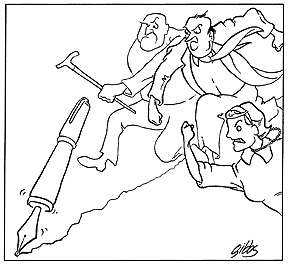by Doug Nufer
The Free Press
Illustration by Jim Gibbs
 Art Ward at the Department of Construction and Land Use (DCLU) is on the verge of deciding whether a literary arts center will be permitted to function in a mansion at 1254 10th Ave. E. At first glance, the decision is simple. Linda and Jeremy Jaech want to buy Capitol Hill's $2 million "pink palace" that has been on the market for three years (and occupied for only seven of the last thirty years) and donate it to Richard Hugo House, a nonprofit foundation where writing classes, readings, seminars, and meetings could take place. The Jaechs would also endow afund to maintain the property and, after neighbors complained about parking, Hugo House arranged to use the Scottish Rites lot across and down 10th Ave. for special events. If their request is denied the site covering six city lots could well be sold to a developer who'd replace the unsaleable mansion with a sixpack of houses priced to go. In 37 years at the DCLU Ward can't remember when a conditional use permit has been denied, nor has he had to deal with many cases as contentious as this one.
Art Ward at the Department of Construction and Land Use (DCLU) is on the verge of deciding whether a literary arts center will be permitted to function in a mansion at 1254 10th Ave. E. At first glance, the decision is simple. Linda and Jeremy Jaech want to buy Capitol Hill's $2 million "pink palace" that has been on the market for three years (and occupied for only seven of the last thirty years) and donate it to Richard Hugo House, a nonprofit foundation where writing classes, readings, seminars, and meetings could take place. The Jaechs would also endow afund to maintain the property and, after neighbors complained about parking, Hugo House arranged to use the Scottish Rites lot across and down 10th Ave. for special events. If their request is denied the site covering six city lots could well be sold to a developer who'd replace the unsaleable mansion with a sixpack of houses priced to go. In 37 years at the DCLU Ward can't remember when a conditional use permit has been denied, nor has he had to deal with many cases as contentious as this one.|
"Another neighbor expressed intense dismay that her children might be kept from using the property's jungle jim." |
[To comment on conditional use permit #9602399, write to the DCLU, 710 2nd Ave. #200, 98104. Comment period expires in early March; decision due April 1.]
 |
 |
 |
 |
 |
Contents on this page were published in the March/April, 1997 edition of the Washington Free Press.
WFP, 1463 E. Republican #178, Seattle, WA -USA, 98112. -- WAfreepress@gmail.com
Copyright (c) 1997 WFP Collective, Inc.
